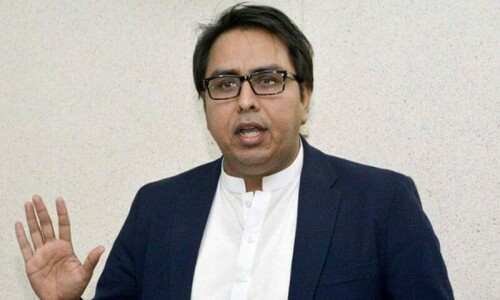ISLAMABAD: Taking a stand before the Supreme Court in its reply to the challenges to the 21st Amendment, the Punjab government says that judiciary has a unique characteristic in the Constitution of Pakistan and cannot be said to be accountable to people, unlike India where the judiciary is responsible to parliament.
In a ten-page reply submitted before the Supreme Court, the provincial government explained that the judiciary was bound to honour the authority conferred on parliament by the people of Pakistan through their chosen representatives.
Earlier on Feb 23, the federal government had urged the court in its reply to respect its decision to try terrorists through military courts – through the 21st Amendment to the constitution, made in consultation with all political parties – since it was left with very limited choice.
Reply before SC in 21st amendment case rejects theory of basic structure
A three-judge Supreme Court bench headed by Justice Anwar Zaheer Jamali has already referred the petitions to Chief Justice Nasirul Mulk to consider constituting a larger or full-court bench, consisting of all the judges of the apex court, to adjudicate in the matter.
Now, a rejoinder before the court, submitted on behalf of Punjab Law Secretary Dr Syed Abul Hassan Najmi, compared the constitutions of Pakistan and India and explained that the founding fathers of India were the framers of the original Indian constitution and therefore the Indian Supreme Court can be entitled to assume that their constitution was sacrosanct because it contains the vision of their founding fathers.
But this is not the case in Pakistan, the reply said, emphasising also that there was no agreement even on the Objectives Resolution as all minority members in the first Constituent Assembly did not vote in favour of the resolution.
Besides, Pakistan had three constitutions before the current 1973 constitution, which was not framed by our founding fathers — thus making it distinguishable from that of India.
For these reasons, Punjab argues, the basic structure or the salient features of the constitution hardly have any foothold as a principle of constitutional interpretation in Pakistan. In its petition, the Lahore High Court Bar Association (LHCBA) has urged the apex court to declare the 21st Amendment as being against the basic structure of the constitution.
Therefore, the question of adhering to original intent does not arise as it may arise in the case of India, the reply emphasised.
Moreover, the rejoinder said, the constitutional dispensation in India is somewhat different from that in Pakistan in the light of Article 239 (5-6), which bars any challenge to any amendment in any court and also empowers parliament to remove any doubts or ambiguities or amend any provision of the Constitution. This provision does not form part of the Indian constitution, the reply argued, adding that in Pakistan the constituent power of the parliament is above the Constitution and is not bound by its basic features.
In the face of Article 239 (5–6), Punjab argued, no court has the authority to question the constituent power of parliament or to declare an amendment invalid on the touchstone of the abstract concept of the basic structure.
Punjab further emphasised that the abstract term “basic structure” had no definite meaning and cannot be deployed to negate the express command of the constituent assembly, contained in Article 239 (5-6) and that the Supreme Court had no jurisdiction to interpret any provision of the Constitution in a manner which is likely to render the express command of the assembly redundant or ineffective.
Published in Dawn, March 1st, 2015
On a mobile phone? Get the Dawn Mobile App: Apple Store | Google Play















































